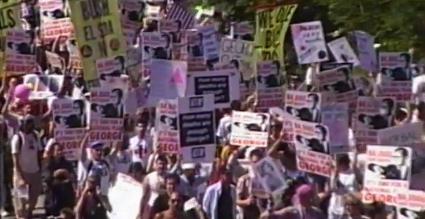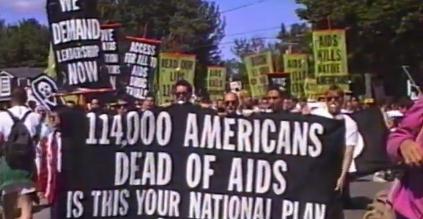
Credit: surviveaplague.com
The title of the Oscar-nominated documentary How to Survive a Plague implies two things: an instruction manual and a story of biblical proportions.
Using archival video footage, filmmaker David France has knit together the story of ACT UP (AIDS Coalition to Unleash Power), which has all the drama and wonder of a Cecil B DeMille film, but with thick New York accents and acid-wash jeans.
Beginning six years into an AIDS epidemic with no cure in sight, the film reveals the gentler side of ACT UP, a group synonymous with uncivil disobedience and Silence=Death buttons. Preparing to protest against the New York mayor Ed Koch, we see exactly how scared and uncertain these people actually were, especially as they link arms and walk out into traffic.
As well orchestrated and in-your-face as ACT UP’s protests would become, founding member David Barr brings us back to earth when he says, “No matter how bad things are for our people right now, I want to keep living.”
“Bad” is an understatement. Things could not have been much worse for gay people.
With AIDS deaths climbing toward a million, American president Ronald Reagan had yet to say the word AIDS in public. In the Senate, Jesse Helms blocked federal funding for research, arguing that people with AIDS had brought it on themselves.
Listening to Helms’ rhetoric 25 years later, it is easy to draw parallels between him and the current crop of conservatives and their inaction on climate change and gun control.
The situation grew even more dire after New York City’s bishop condemned the use of condoms.
While the religious right invoked the ire of god, ACT UP activists fought back by assuming the role of Jesus and shouting speeches through bullhorns that echoed the fire and brimstone of the prophets.
Like any good epic, How to Survive a Plague has a cast of thousands that are dragged and beaten by police, but not without staging a spectacle that always succeeds in delivering its message. There are many powerful moments in this film but none as powerful as the footage of protesters spreading the ashes of AIDS victims on the White House lawn to get the attention of president George Bush.
The film offers a blueprint for people striving to achieve a “decent society,” as one activist puts it, in a time when “liking” something on Facebook constitutes activism.
What separates ACT UP from the Occupy Movement of today is that ACT UP didn’t just point out the error of the government’s ways; it provided solutions that worked and are still in use today.
More than a document of the dark ages in queer history, How to Survive a Plague is a movie for our times and a wake-up call to everyone. It’s a reminder of what can happen when we let bureaucracy get in the way of doing what is right.
It is also a story with a happy ending.

 Why you can trust Xtra
Why you can trust Xtra


